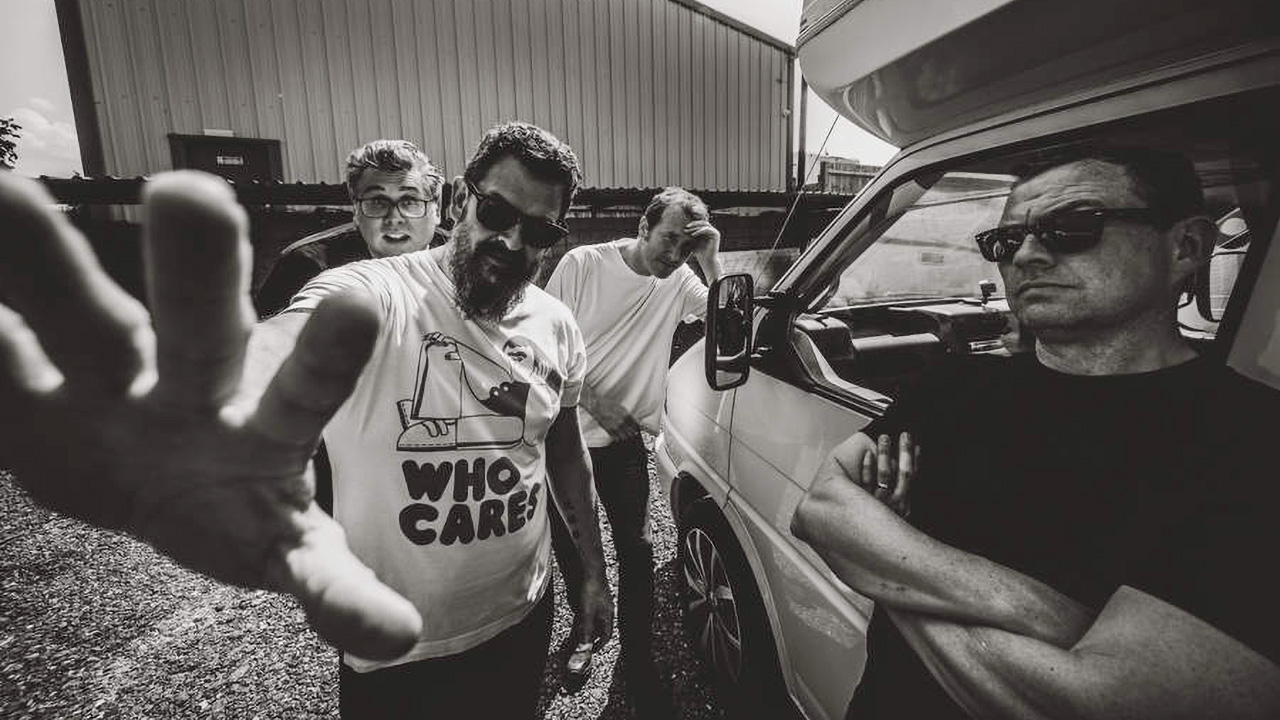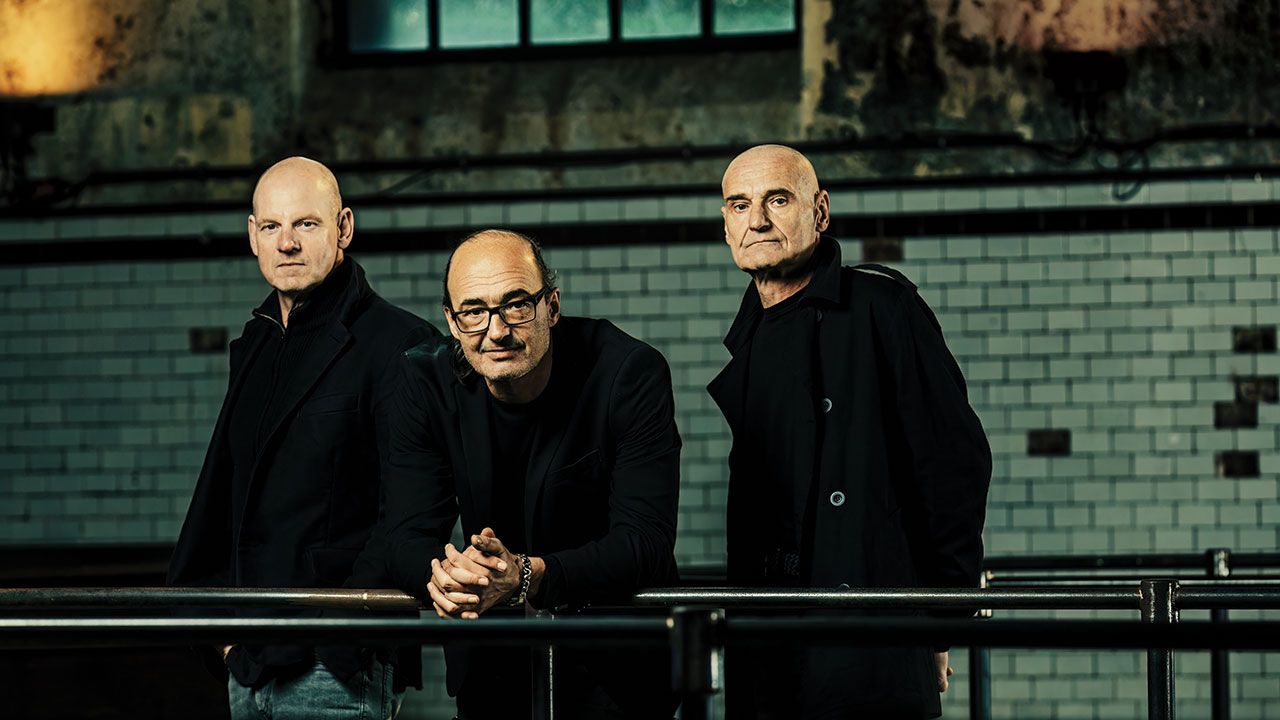“In the context of Matt’s cancer, and stuff going on in the wider world, why are we worrying about if anybody’s going to like this?” The Fierce And The Dead refocused for News From The Invisible World
Their “angry but hopeful” fourth album is their first to feature vocals, and it’s already given them a new lease of life

Select the newsletters you’d like to receive. Then, add your email to sign up.
You are now subscribed
Your newsletter sign-up was successful
Want to add more newsletters?
A cancer diagnosis, that pandemic, a broken arm… the odds were stacked against The Fierce And The Dead’s new album, News From The Invisible World, from the get-go. “Everything that could go wrong did go wrong,” guitarist Matt Stevens reflects. “But in many ways it gave us a focus and gave us time to really put things under a microscope. And I think the music became a thing that gives a bit of hope for the future, and something that really meant a lot to all of us.”
There was not just change in the genre-defying quartet’s personal lives, though. The album – their fourth – features vocals; yes, after more than 10 years of instrumentals, The Fierce And The Dead are now stepping in front of the microphone. That job has landed on bassist Kevin Feazey (no pressure then). It’s such a natural fit to the sound of the record, though, that you wonder why it’s taken so long for them to give it a bash. But more on that later.
The London-based group have grown over the last decade or so into perhaps the epitome of a cult band, with dogged determination, ear-catching yet experimental tunes and a loyal fanbase resulting in their stock steadily rising. But News From The Invisible World should see new doors opening for the uninitiated. Stevens once described it as the group’s “Kid A moment”– a nod to the 2000 Radiohead record that saw the indie demigods diverge from rock music and indulge in different sounds. It’s proggy, heavy, melodic, dark, light; some moments slathered in soundscapes, some painted Crimson, some fit for the radio. The band continue to defy pigeonholing.
“The most commercial thing for us to do was make the last album over and over again, for several years and play bigger and bigger festivals,” Stevens says from his home via Zoom. “That would have been the easy option, but we just want to do different things. If you repeat the same process, you don’t get the same excitement and get the same results at the end. What you have to do is throw everything up in the air and start again. If you ever try to do the same things the same way twice, it just doesn’t work.”
One of those new colours sitting proudly on the palette is the vocals. Feazey – who has sung in bands before – is said to have spent a great deal of time working through how best to present his singing, and the end result is pretty impressive, all things considered. There was no grand plan to introduce vocals, though. Like some of the best things in life, it just kind of... happened.
“It was the same as the decision to not have vocals in the first place,” Feazey recalls. “There was no meeting where we sat down and said, ‘Do you know what? We’re going to be an instrumental band.’ If we decided Matt’s going to start playing trumpet, then we’d do that.”
But the group are adamant that they don’t really have a lead singer, as such. The vocals are teased out and produced in a way so it weaves into the rest of the music, and it’s all part of the multi-layered approach.
Sign up below to get the latest from Prog, plus exclusive special offers, direct to your inbox!
“We’re a band – there’s four of us – and there’s no lead singer, there’s no lead thing,” Feazey says. “Somebody said the other day that the vocals sound like another instrument. That was very intentional. It was done with an audience in mind as well. We have things that we wanted to say with the lyrics, but I didn’t want it to be the outpourings of my sixth form college poetry book. Every gig we’ve done is a conversation between us and the audience, and we’re really keen that the vocals just continue that.”
With a new platform to shout from, much of the lyrical content remains enigmatic, but the group soaked in the aura pervading the world at the time. ‘Are you counting up all that you have/Are you making sure this too shall pass/And you try to keep head up high/Keeping pace, stand up to glorify,’ Feazey belts out on Shake The Jar.
“They always say write what you know, and I’m not a good enough lyricist – none of us are – to be able to have Nick Cave-esque grand lyrical themes,” Feazey says with a smile. “But we were just writing about the atmosphere that was around us. We had this existential threat from the pandemic, but at the same time people were digging deeper into technology, and this technology was allowing us to progress artistically, at the same time as society was crumbling around us.
“Several of us have been over the years working in various types of care and things like that, so we’ve seen how systems work. Through the band we’ve spent a lot of time online, and seeing how that changed over the pandemic as well and all the misinformation coming around. It was a weird one because, yeah, just this sense of the other: this kind of thing in the future, but at the same time being pulled to the past.”
The band are also clear that there was no comprise on the new album. It was a record that they wanted to make, and in some ways, what they needed to make. “In the context of Matt’s [cancer] diagnosis and stuff that was going on in the wider world, it’s just like, why on earth are we worrying about if anybody’s going to like this?” Feazey says. “Let’s just make something that we want to make.”
Rewind a few years, and it was shortly after the release of The Fierce And The Dead’s well-received third record, The Euphoric, that Stevens began to fall ill. A tumour developed, and the guitarist needed to have courses of painful treatment over a period of about two years. But even over the digital restraints of a Zoom chat you can still feel that Stevens has sought to morph a crushing negative into a positive.
“I was having the treatment during Covid, so [there’s] the level of complexity of having that kind of treatment during the pandemic where everyone’s got to wear the masks,” he says. “But so far so good, I’m still being tested regularly, but I’ve seemed to have come through the worst of it. It definitely gives you a different perspective on life: you realise that every day you wake up is a bonus, and nothing is guaranteed.
“It [the music] really felt like it gave us some sort of sense of purpose during a weird time. At one point we thought: ‘Is this ever going to come out? Is this ever going to be finished?’ It got to a point where we thought: ‘Are we actually going to make an album? Will we ever play gigs again?’”
They did, thankfully – three festivals last year, and a sold-out album release show is planned for London in October, with more UK shows lined up for next year. But getting out on the road and mingling with society feels a far cry from the process behind the creation of News From The Invisible World, with the pandemic plunging the quartet into a digital-led world with home set-ups connecting via Zoom and Pro Tools.
“We were all quite isolated,” Feazey reflects. “At that point three of us were in London, one of us was outside London, and it was like: ‘What do we do? Do we just sit here, or do we try and work out a way of doing this?’ We realised, as I think a lot of people realised, that that kind of social element of even just us four getting together and playing music, was massively important for our mental health.”
But the online world also gave The Fierce And The Dead something to hold onto during the trying times. More than 5,500 people – AKA the Fierce Army – are members of a fan group on Facebook. It might be small fry for some, but for these guys it is treasured.
“All through this, that little community that we’ve been so lucky to be part of online, it really was amazing because... even just like people just checking in with each other, using our group page,” Feazey says. “It wasn’t even about the band at one point, it was just about these people, like-minded, just having somewhere to hang out, having somewhere to express themselves. Everybody’s non-judgmental. It was really something special.”
It was back in 2010 when the group first formed, as a trio, channelling post-rock and having the brazen chutzpah to smash out a 19-minute song as their first release. With guitarist Steve Cleaton joining to make three into four – drummer Stuart Marshall is the other piece of the jigsaw – they splashed onto the live circuit, ultimately ending up sharing stages with Hawkwind, Anathema and Knifeworld. Their ethos is to not keep doing the same thing twice, and it shows in their releases, from the post- rock fun of their 2011 debut album, If It Carries On Like This We Are Moving To Morecambe, to the depth of their last, The Euphoric, which is described as their “breakthrough.”
This time around things shift even further; wanting to make an “ambitious record like Mercury Rev and the Flaming Lips made in the late 90s”, News From The Invisible World, at times, feels a snug fit for the indie-leaning BBC Radio 6 Music, with Queens Of The Stone Age often flecked over the songs and the vocals opening the door for a whole new audience. But true to style there are still plenty of experimental jolts out of the blue; it’s easy to get lost in the snaking bass line on Wonderful, for example, while What A Time To Be Alive chucks in some bouncy, doomy stoner riffs, because why not?
But with a seeming new-found energy The Fierce And The Dead have already ploughed headfirst into writing material for a follow-up. “We’ve started work on the next album already,” Stevens reveals. “We just spent the weekend at a studio. It’s just a bloody joy to be together in a room again.”
For now, though, it’s all about News From The Invisible World – an album that was once shrouded in doubt and uncertainty. Buoyed by Stevens’ new lust for life after going through the ordeal of cancer, the takeaway feeling is that the foursome’s eyes are firmly looking forward, not back.
“You have to find the joy in everything, and try and appreciate what you’ve got,” the guitarist reflects. “It’s made me a lot more positive about things, it’s made me more optimistic. I think this is quite an angry record in some ways, but it’s hopeful. An experience like that will change you, and it will give you a feeling of gratitude to be alive. I’m just grateful to still be here, to be honest.”
A writer for Prog magazine since 2014, armed with a particular taste for the darker side of rock. The dayjob is local news, so writing about the music on the side keeps things exciting - especially when Chris is based in the wild norths of Scotland. Previous bylines include national newspapers and magazines.

